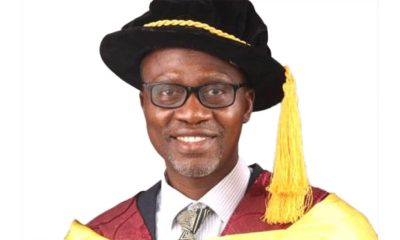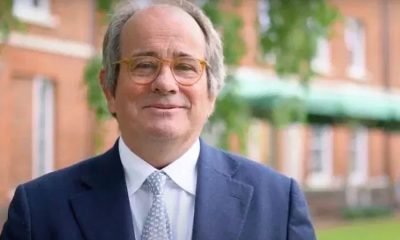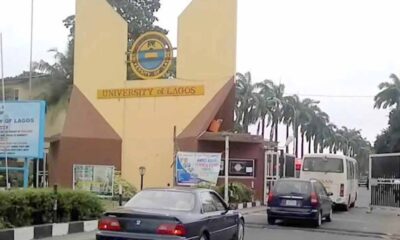Education
UNILAG set to name new VC as Ogundipe bows out Nov 11
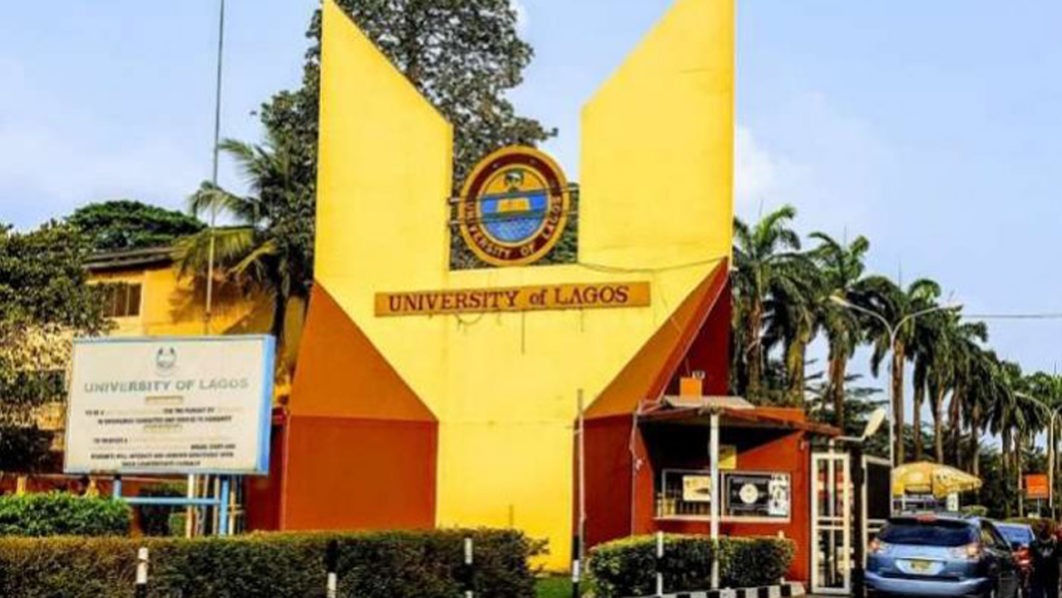
The outgoing and 12th vice chancellor of the University of Lagos, Prof. Oluwatoyin Ogundipe, is billed to end his five-year single term in office on November 11.
The Governing Council of the university is expected to announce the institution’s 13th substantive vice-chancellor this Friday, according to a report by Premium Times.
It recalled Ogundipe, who was appointed in 2017, had running battles with the immediate past Pro-chancellor and Chairman of the university’s Governing Council, Wale Babalakin, over allegations and counter-allegations of corruption, highhandedness, and insubordination, among others.
Babalakin’s successor, also an alumnus of the university, Lanre Tejuoso, hinted at the possible announcement on Monday at the university’s medical college in Idi-Araba, Lagos, during an event to mark the university’s 60th anniversary.
Tejuoso, however, did not give the details of the process, but PREMIUM TIMES’ findings revealed that out of eight professors that submitted applications before the deadline for submission in June, seven were shortlisted by the council last week.
Stakeholders are, however, surprised that only eight applicants took part in the race. This, to some of the university staff members, could be attributed to the calibre of “some individuals in the race.”
But the pro-chancellor has assured of a level-playing field for all the participating candidates, saying as a proud alumnus, he would ensure that the new peaceful atmosphere on the campus is sustained.
He said, “The process has started and I introduced democracy. When we went for a council meeting they did not expect that I would bring ballot papers.”
He said neither the friends of the outgoing VC nor his own associates were part of those who decided on the criteria on the shortlist.
“Everybody picked their own ballot paper and those who became members were chosen by God,” he said.
He said whoever would emerge as the vice-chancellor will be God’s choice, “because the process will be transparent.”
The seven candidates shortlisted are lecturers in the university from the Faculties of Management Sciences, Arts, Law, Sciences, and the College of Medicine.
They are Abayomi Akinyeye of the Department of History, Faculty of Arts; Folasade Ogunsola of the College of Medicine; Mathew Ilori and Adeyinka Adekunle both of the Department of Microbiology and Botany, Faculty of Sciences.
Others are Imran Smith, Faculty of Law; Timothy Nubi, Department of Estate Management at the Faculty of Environmental Sciences, and Ayo Olowe of the Department of Finance, Faculty of Management Sciences.
About Ogunsola
Folasade Ogunsola is a professor of Medical Microbiology and a consultant clinical microbiologist and infection control for the Lagos University Teaching Hospital.
Born in 1958, Mrs Ogunsola holds a PhD in Medical Microbiology, an MSc in Medical Microbiology with Distinction, and a Diploma in Biomedical Techniques from the University of Wales College of Medicine, Cardiff, among others.
A fellow of the Royal College of Pathologists, West African College of Physicians, National Postgraduate Medical College in Pathology, Nigerian Academy of Science, and Foundation Fellow of both the Nigerian Academy of Medicine and the Academy of Medicine Specialties.
Professor Ogunsola had served as the university’s acting Vice-Chancellor and former Deputy Vice Chancellor in charge of Development Services. Before that, she had also served as the pioneer and only female Provost of the university’s College of Medicine.
She also served as a governing council member for three terms, ranking as the only one with a such number of years in the governing council among the contenders.
Ogunsola is said to have received various prestigious awards from both local and international bodies and has one hundred and forty-two (142) publications in reputable academic journals and has co-authored four (4) books.
She has successfully supervised or co-supervised eight (8) doctoral students and 61 master’s students
About Nubi
Timothy Nubi is a Professor of Estate Management and currently the director, University of Lagos Research Management Office.
Born 27 July 1961, Mr Nubi obtained a National and Higher National Diploma in Town Planning at the Ogun State Polytechnic and Yaba College of Technology respectively.
Nubi bagged a bachelor’s degree in Estate Management at the University of Lagos, and Master’s and PhD certificates in the same university.
He has published 98 papers on various issues around housing and urban development and founded the Ideal Habitat Initiative, a non-governmental organisation that introduces people to a cooperative approach to home ownership through urban regeneration. He also published a book “Home Ownership Made Easy” in 2003.
With more than thirty-five papers on various issues of Housing and Urban Development, Professor Nubi led the first national workshop on “Land Management and Property Tax Reform.”
A former Dean of the Faculty of Environmental Sciences, Nubi is the founding Director, University of Lagos Centre for Housing and Sustainable Development.
Smith
Imran Smith, a professor of Private and Property Law and a Senior Advocate of Nigeria (SAN), has been a professorial research associate at the School of Oriental and African Studies, University of London since 2010.
Smith obtained his Bachelor of Law (LLB) at the University of Lagos in 1982, his Masters at the Hague Academy of International Law, the Netherlands in 1989 and PhD at the Oxford City Academy, Oxford, the United Kingdom in 2018.
The professor became a solicitor of the Supreme Court of England and Wales in 2007 and Senior Advocate of Nigeria in 2010.
Imran had at different times headed the university’s Department of Private and Property Law and also served as the Dean, Faculty of Law.
Akinyeye
Abayomi Akinyeye obtained his Bachelor’s, Master’s and Doctoral degrees in History in 1981, 1985 and 1991 respectively, at the University of Lagos.
He joined the university’s Department of History and rose through the ranks to become a professor in 2005.
A former Dean of the Faculty of Arts from 2013 to 2015, and a member of the university’s governing council from 2012 to 2016. He is a member of the specialised committee on the Humanities of the Nigerian National Order of Merit Award’s Governing Board and a former Chairman of the university’s branch of the Academic Staff Union of Universities (ASUU). He was also the union’s Ibadan Zonal Coordinator from 2007 to 2010.
Akinyeye belongs to different professional bodies and is a Fellow of the Historical Society of Nigeria (HSN), regarded as the country’s pioneer academic association.
Ilori
Born on 4 July 1963, Matthew Ilori obtained his degrees, Bachelor of Science in Biology, Master of Philosophy in Microbiology and Doctor of Philosophy in Microbiology at the University of Lagos in 1984, 1990 and 1998 respectively.
Ilori’s teaching experience began at the university in 1986 when he served as a graduate assistant in the Department of Biological Sciences and later moved to the Department of Botany and Microbiology, Lagos State University, Ojo.
In 1996, Ilori returned to UNILAG’s Department of Botany and Microbiology where he rose through the ranks to become a professor in 2009.
A former member of the National Oil Spill Guidelines Drafting Team for NOSDRA, Ilori has also functioned as an external examiner to the University of Cape Town in South Africa, the University of Ibadan and the Lagos State University, Ojo.
Ilori is a recipient of many awards, scholarships, research grants and honours including UNESCO Fellowship in Biotechnology, University of Kent, Canterbury, UK (1997), Alexander von Humboldt (AvH) Fellow, Institut fur Biologie V, Aachen Technical University, Germany (2000-2001), among others.
Adekunle
Adedotun Adekunle was born on 9 February 1963 and bagged a B.Sc (Hons) in Botany from the University of Lagos in 1986.
He also bagged his M.Sc. in Botany and PhD in Botany from the university in 1988 and 1996 respectively.
Adekunle joined the university in 1989 as a Graduate Assistant at the University of Lagos became an associate professor in 2010, and is now a professor.
In 1999, he was awarded a UNESCO fellowship in Biotechnology and won the UNILAG faculty winning research award, for the College of Medicine through the Department of biochemistry in 2006.
Olowe
Olowe, whose comprehensive profile could not be obtained as of the time of filing this report, was a chairman of the UNILAG chapter of the Academic Staff Union of Universities, and a former head of the Department of Finance, Faculty of Management Services, on the campus.
Education
Two ex-VCs, JAMB registrar to attend Prof. Ibraheem UNILAG inaugural lecture Wed
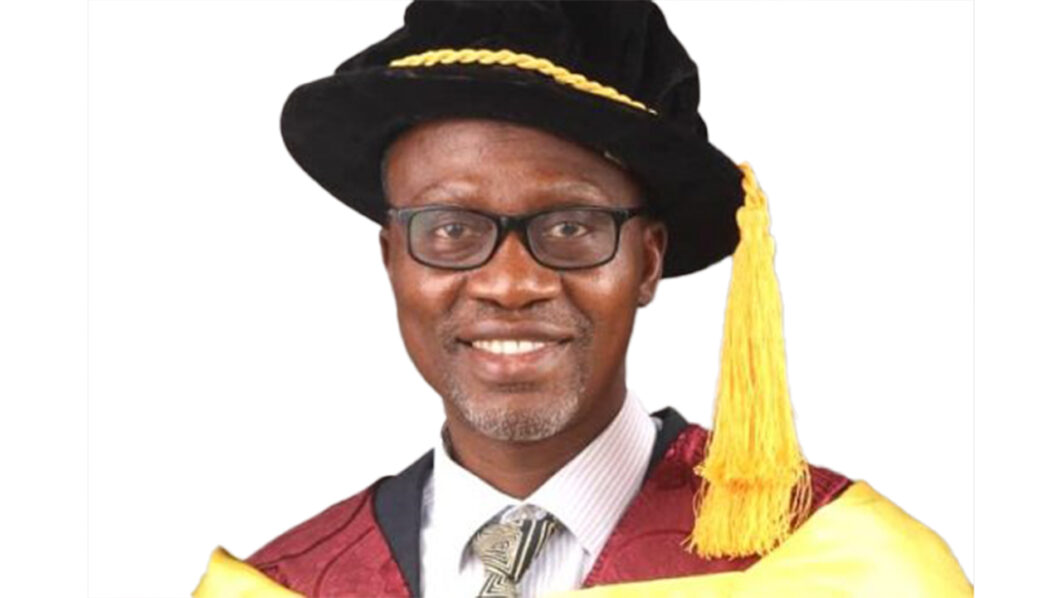
Two ex-VCs, JAMB registrar to attend Prof. Ibraheem UNILAG historic inaugural lecture Wed
- History beckons as Mass Comm alumnus delivers inaugural lecture Wed
History will be made this week Wednesday December 18, 2024 at University of Lagos when an alumnus of the university’s Mass Communication Department, Ismail Adegboyega Ibrahim, professor of journalism and communication studies, will deliver inaugural lecture as a lecturer of the department.
Ibraheem, a 1990 graduate of the university, returned to the institution in 2011 as a lecturer.
It is the first time a former student of the department will be delivering an inaugural lecture 58 years after its establishment.
Ibraheem, director of International Relations, Partnerships and Prospects at the UNILAG, will speak on “Casino Journalism and the End of History.”
The university’s Vice-Chancellor, Professor Folasade Ogunsola, will chair the event, according to a statement from the institution.
Two former vice-chancellors of the university, Professor Rahamon Bello and Professor Oluwatoyin Ogundipe, are expected to grace the lecture along with the Registrar of the Joint Admissions and Matriculation Board (JAMB), Professor Is-haq Oloyede, among others.
The lecture is scheduled for 4pm at the J.F. Ade. Ajayi Auditorium, UNILAG, Akoka.
Members of the University Community and general public are invited to join the lecture physically or virtually via Zoom Meeting ID:862 1255 2361.
Education
Austria offers scholarship grant for int’l postgraduate, research students

Austria offers scholarship grant for int’l postgraduate, research students
The Republic of Austria is offering an opportunity for international postgraduate students, PhD candidates, and postdoctoral researchers through the Ernst Mach Scholarship 2025.
Managed by OeAD-GmbH, Austria’s agency for education, this scholarship aims to support talented individuals in advancing their academic and research careers in Austria.
Details of the scholarship program
According to OeAD, the Ernst Mach Scholarship is open to students and researchers from various academic disciplines. This includes areas such as;
- Natural sciences
- Technical sciences
- Human medicine
- Health Sciences
- Agricultural sciences
- Social sciences
- Humanities, and arts.
The scholarship provides funding for semester or one-year grants, with research grants lasting from one to nine months, making it accessible to a broad range of applicants.
Benefits of the Ernst Mach scholarship
The scholarship offers numerous benefits to successful applicants.
- Recipients will receive a monthly stipend of €1,300 for the duration of their stay in Austria.
- Accommodation assistance is available, with affordable housing options ranging from €330 to €800 per month.
- OeAD will also provide administrative support to help applicants find suitable housing.
READ ALSO:
- Afe Babalola gets court order banning publication, sale of Dele Farotimi’s book
- Over 50 nuisance taxes will be scrapped — FG
- BREAKING: Blackout as National grid collapses again, 12th time in 2024
Grant holders will receive guidance on obtaining health insurance accepted in Austria, with a cost ranging from €55 to €200 per month. The scholarship also waives tuition fees at public universities, further reducing the financial burden on participants.
A travel subsidy of up to €1,200 is available for applicants from eligible developing countries, with travel invoices required for reimbursement. Moreover, recipients will have the opportunity to build valuable connections with top researchers and institutions in Austria, which can significantly enhance their academic and professional networks.
Eligibility criteria for applicants
The Ernst Mach Scholarship is open to early-career academics who are passionate about advancing their research. To be eligible, applicants must be;
- Postgraduate students pursuing a PhD outside Austria or postgraduates and postdoctoral researchers looking to conduct research in Austria.
- Additionally, postdocs employed at universities outside Austria are also eligible to apply.
- Applicants must be 35 years old or younger (born on or after October 1st, 1989) and should not have lived, studied, or worked in Austria for more than six months prior to applying.
- Proficiency in English or German is required to ensure effective communication during the research process.
How to apply for the Ernst Mach Scholarship
To apply for the Ernst Mach Scholarship 2025, interested individuals must visit the official OeAD-GmbH website.
The application deadline is February 1st, 2025. Applicants should ensure that they meet the eligibility requirements and submit all required documents before the deadline.
Austria offers scholarship grant for int’l postgraduate, research students
Education
LASU workers declare indefinite strike over salary
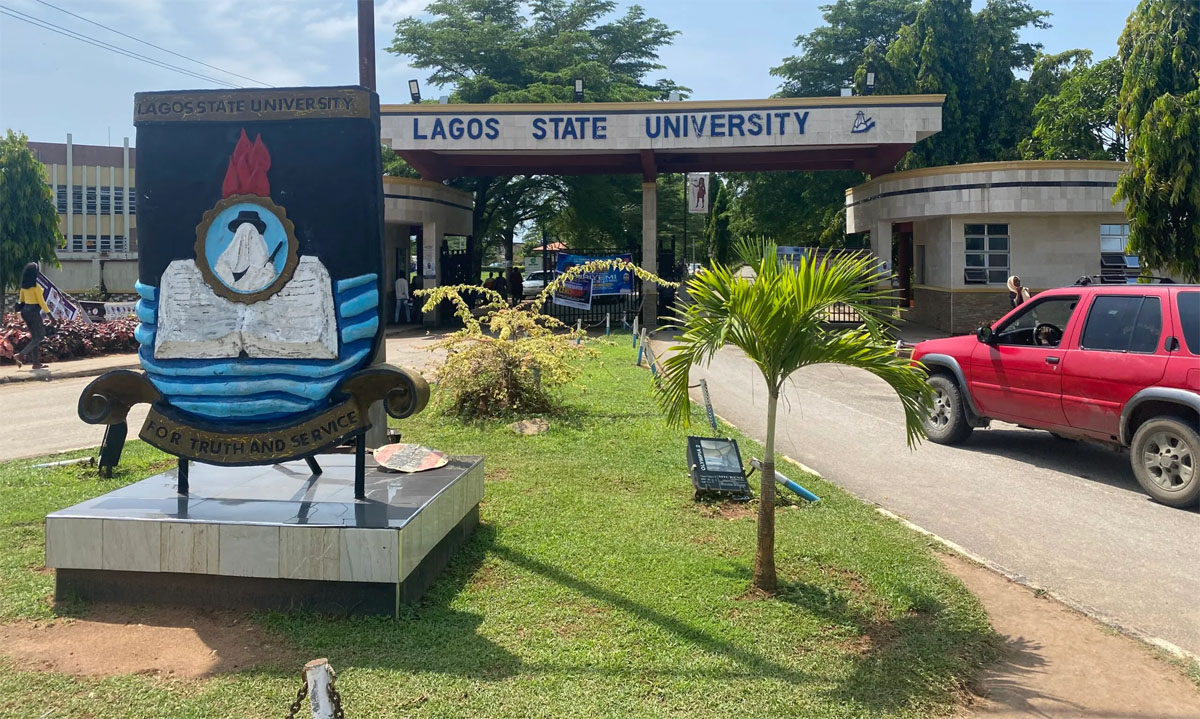
LASU workers declare indefinite strike over salary
The joint action committee of the academic and non-academic staff of Lagos State University (LASU), Ojo, on Monday, declared an indefinite strike.
Their demands from the Lagos state government – their employer – include an increase in salary and addressing salary disparities between LASU and other universities in the state.
It also includes payment of 20 percent salary increase as promised by the governor during his election campaign.
Others include payment of 20 per cent and 35 per cent agreement reached between the federal government and university workers.
The unions involved include the LASU chapters of the Academic Staff Union of Universities (ASUU) and the Senior Staff Association of Nigerian Universities (SSANU).
Also involved are the LASU Chapters of the Non-Academic Staff Union of Educational and Associated Institutions (NASU) and the National Association of Academic Technologists (NAAT).
Justice Obafemi, the chairman, NASU-LASU, said that the genesis of the industrial action was the promised 20 per cent salary increase made by Gov. Babajide Sanwo-Olu of Lagos during his electioneering campaign.
READ ALSO:
- Haiti: Gang kills 110 people accused of witchcraft
- Police rescue 36 kidnap victims in Kebbi
- Youth group insists on Seyi Tinubu as next Lagos governor, says “Pastors hand over to their sons”
Mr Obafemi said that after the election, the governor only paid the civil servants at Alausa Secretariat, neglecting the staff of the tertiary institutions.
“They used us, and in spite of our active contributions and efforts we made during the election, they have not fulfilled their promise.
“There is also a disparity in payment of salaries between LASU and the other two state-owned tertiary institutions.
“Even before Adeniran Ogunsanya College of Education (AOCOED), and Lagos State Polytechnic (LASPOTECH) transmuted to universities, their staff were earning more than LASU staff,” the NASU chairman said.
Mr Obafemi added that when the administration came on board as new leaders, the unions wrote to the state government to look into the disparities.
“Also, the 20 per cent and 35 per cent agreement reached between the federal government and university workers.
“We set up a committee to look into it and sent all our requests to the government to harmonise salaries of all the academic institutions in the state.
“We had several meetings with the Lagos State Ministry of Tertiary Education and Ministry of Establishment and Training.
“Also, the LASU management tried to step into the matter. The vice-chancellor has pleaded several times, but we cannot continue to sacrifice the welfare of our union members,” Mr Obafemi said.
READ ALSO:
- 2027 presidency: Tinubu hasn’t shown reasons to be re-elected – Atiku
- Wike, AGF seek amendment of TETFund Act to include Law School
- New PH refinery over 90% completed —Mele Kyari
Ibrahim Bakare, chairman of ASUU-LASU, said that the unions were more interested in peace, adding that the action was an agitation for staff welfare.
Mr Bakare said that all unions in the institution decided to come together and collaborate to get to where they are today.
“We are being civil and not disrespecting the Senate of the university. We will remain calm for the government to address our demands and call us for a meeting,” he said.
Seyi Lawal, chairman, Senior Staff Association of Nigerian Universities, SSANU-LASU, said that it had discussed and given the government several ultimatums to address and meet its demands.
Mr Lawal said that the government had been playing games with them, so the unions decided to take action by calling for an indefinite strike.
“We have not even gotten to the stage of payment of minimum wage; we want the government to address these demands first,” he said.
Oluwayemisi Thomas-Onashile, coordinator, centre for information and public relations, LASU, said in a statement that the institution’s Senate had declared a Christmas and New Year break for the students and staff.
She said that the break started today till Jan. 5, 2025, adding that all university activities, including lectures and socio-academic events, would resume on Jan. 6, 2025.
“All students residing in the university’s hostels across all campuses (Ojo, LASUCOM, Epe and Badagry) are required to vacate the hostels within 48 hours.
“The university management appreciates the support and dedication of staff and students throughout the year and wishes everyone a joyous Christmas and a prosperous New Year,” Mr Thomas-Onashile said.
LASU workers declare indefinite strike over salary
(NAN)
-

 Railway14 hours ago
Railway14 hours agoLagos Rail Mass Transit part of FG free train ride – NRC
-

 metro2 days ago
metro2 days agoCourt stops customs from seizing imported rice in open market
-

 metro3 days ago
metro3 days agoFG transfers electricity market regulatory oversight in Lagos to LASERC
-

 metro2 days ago
metro2 days agoAfe Babalola: Court grants Dele Farotimi bail, barred from media interviews
-

 metro2 days ago
metro2 days agoIbadan stampede: Tinubu orders probe as death toll hits 40
-

 News2 days ago
News2 days agoAdebayo Ogunlesi, 2 other Nigerians make Forbes 50 wealthiest Black Americans list 2024
-

 metro14 hours ago
metro14 hours agoNIMC warns against extortion, reaffirms free NIN enrollment
-

 metro2 days ago
metro2 days agoNAFDAC seizes N5bn fake rice, seals factory in Nasarawa

